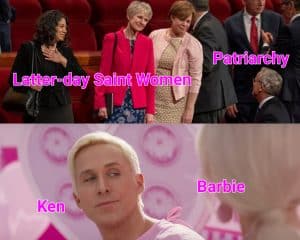“The soul knows who we are from the beginning.”
– Plato
When I read 1 John 4:16 in seminary during my freshman year of high school, my mind was blown: “God is love, and all who live in love live in God, and God lives in them.” God is love? God is not a man but some magical thing that can live inside us? Whoa. In an incredibly awesome moment, I realized that I knew God: I knew God because I knew love. I was stunned to tears. God finally made sense.
I ran my finger over the words: “God is love” as I looked around at the Provo High seminary students who held God inside them.
When it was time to share and discuss, the class discussed apostasy and spiritual darkness. The seminary teacher made a list on the board: “How to know when someone is experiencing spiritual darkness.”
The juxtaposition between my reading and the seminary lesson was jarring; the same scriptures that healed me condemned me and my friends, brothers, aunts, and uncles – some of the most loving people I had ever known.
I raised my hand, “It says right here, that God is love.” God is love! God is in us.
“You need to be careful,” my teacher warned.
I don’t remember exactly what the seminary teacher said but I remember it crushed me and involved the word “antichrists.”
Looking back on this story, I recognize my budding self. Teen me struggled with a lot but I love this story because, even though I spent the next class period crying in the bathroom, I see the strength of that girl who found herself in verses of love.
My testimony was like an unidentified sapling with roots that grew and expanded, and I didn’t even know it existed until I felt it when I read those words, “God is love,” and I recognized its wispy little shape and the deep roots that made me. “Ah,” I thought, “there you are, that is what you look like.”
It surprises me now that I didn’t question the personal revelation I received my freshman year when I first read those words and felt God bursting within me and the people around me. I questioned the man teaching the class. I recognized that what was being taught in seminary was not my experience.
I didn’t return to seminary again until my senior year of high school when I loved it. I loved hearing how peers prayed and what they prayed for, hearing stories where God appeared, learning how others read scriptures as their sacred texts, and being forced to question myself and preconceived notions. My seminary teacher was missing a thumb and made me laugh all the time.
Every year, I receive an email asking me to register my teens for seminary and every year I sit with it for a while and then delete it. My teens choose not to seminary which is both relieving and sobering. Where will my teens discover who God is to them? What stories will they remember about finding the saplings in their souls?
Sometimes, other people’s ideas are like sunshine and spring, and sometimes like a tornado – seminary teachers were both for me. Often we can choose the environments we allow our soul trees to thrive or die in and sometimes we can’t. But I have learned that, sometimes, the only way to recognize our soul tree is to find new outside sources that feed us, a new environment where we can say, “Ah, there you are, that is what you look like.”
What is your sapling made of? What feeds it? What hacks at it? In what environments does it thrive?

Photo by Emmanuel Phaeton on Unsplash
Photo by Kasturi Laxmi Mohit on Unsplash






8 Responses
“What is your sapling made of?”
– I was given a name that translates roughly into “beloved light” – and that defined me during my teenage years, and defines what I do post-faith transition.
When I was in my twenties, I came across Marianne Wilson’s “Our deepest fear” quote that says, “It is our light, not our darkness that most frightens us…”. My soul took that as a challenge to stop being afraid of who I was – because at the core, I was a “beloved (not fearful)” light who had the potential to liberate myself and others with that name-given light.
Since I see myself as a “light empowering person” – my attention has shifted to created “Win-Win” situations that empower everyone involved. I am learning to say, “that is hurtful” and “I need specific accommodations” instead of dodging the metaphorical questions involved by not defining the hurt and/or the specific accommodations.
Oh my. This is beautiful and clear. Thank you for sharing. I love your determination to stop being afraid of the glorious light inside you – I can feel your power and light from your comment. Thank you.
Having attended and taught seminary myself, and seen what has happened to my children under difficult teachers, I can say that it is a fraught decision and that going can be good or bad for testimonies and socialization. Everyone must make the choice that feels best for their family, and yet, the blessings of that sacrifice have stayed with me lifelong.
Well said. Thank you.
I also had some seminary teachers who were of the “obedience is the first law of Heaven.” And my soul screamed, that isn’t what Jesus taught. Then I had New Testament with a teacher who was not a career seminary teacher, but had a different career and taught one class because he loved it. He taught that the first and greatest commandment is love, and he taught it by example. He taught us that Jesus called God the father Abba, which is translated into English as Daddy. Because when you love and are close to your Father you call him Daddy.
One day, I got there way early because I was avoiding a guy (remember, high school and not being able to just tell the guy you were not interested) But it was early enough that he was still setting up and I was the only one there. He said good morning, and then said, “do you know you are named after a prophetess? She recognized the Savior, and so do you.” Then he just went about rearranging the chairs into the circle he liked instead of standard classroom rows. I had never heard of Anna, or any other female prophetess. We just are not taught about them in our sexist church lessons, but we had learned all about the important prophet Simon who knew the Christ child. In the New Testament, Simon was no more important than Anna, but who was taught as an important prophet and who was ignored. For the first time in my life, I felt like God loved me. Just a 30 second comment. But he was not your normal CES seminary teacher.
Wow. Thank you for sharing your experience. And thank heavens for good people who are bold enough to mention women, and see young women.
I love that seminary exposes teens to all sorts of people and all sorts of faith . . . I do not regret going – disagreeing with seminary teachers is self building, I guess. Ah. And that moment you describe of feeling God’s love is foundational.
Beautiful, thoughtful post. Thank you.
I have such mixed opinions about seminary. My first year was a great experience, partly, I suspect, because it was new and novel and made me feel grown up, and partly because we had a stellar teacher. Then he moved away, our new teacher was willing but inexperienced (we were well outside the Mormon corridor so he was just a member who’d been given a calling for which he was ill-parepared) and the nicest thing I can think of to say about that class was that we were a challenging group. To make a long story short, there’d been an influx of kids who made things miserable for everybody else and I think anybody would have had a hard time trying to teach in there. Our teacher coped by pairing the more responsible kids with the rabble rousers, presumably expecting them to be a good influence, and I know it’s a tactic employed by other teachers, but all I can say is, no, no, no. Being made responsible for your obnoxious classmate’s behavior makes an already bad experience just that much worse. I never graduated, and having seem what seminary could be versus my reality was – well, frustrating, to say the least.
Some years later, I was called to be a seminary teacher. That’s when I first really comprehended that students who had release time seminary had professional teachers (which doesn’t necessarily mean they were good teachers but bear with me here) whereas everywhere else the kids get random members of the ward who may have a propensity for what they’re doing but may not, who may have had some teaching training but likely haven’t, who may be knowledgeable about the scriptures but may not, all this at some unholy hour of the morning. And that’s a big difference. Completely disparate experiences. I felt, and still feel, really bad for the kids who were in my class that first year because I had absolutely no idea what I was doing. I felt really bad for myself during the D&C year because that was a hard course for many reasons, not least because about half of the lessons focused on priesthood structure and there was nothing in there for the young women to connect with. Sometimes there were lessons over the course of that calling that I didn’t feel that I could in good conscience teach and I had to do some careful manouvering to stay within the doctrinal rails without propounding stuff I didn’t agree with. But there were also some pretty transcendent moments over the four years that I taught and on the whole, I’m glad that I did it.
I just wish the whole experience weren’t so random.